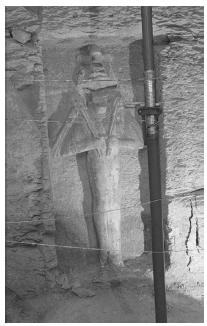Ancient Egypt and the Afterlife
Osiris: death and resurrection
Osiris was called Lord of Lords, King of Kings, and God of Gods by the Egyptians. According to the scholar E. A. W. Budge, "[Osiris] was the god-man who suffered, and died, and rose again, and reigned eternally in heaven. They [the Egyptians] believed that they would inherit eternal life, just as he had done."
The ancient myths proclaim that Osiris first received renown as a peaceful leader of a higher culture in the eastern Delta, then as a powerful ruler over all the Delta, a veritable god of the Nile and its vegetation, growth, life, and culture. He was the husband of Isis, goddess of enchantment and magic; father of the great war god Horus; and finally conqueror of northern Upper Egypt with his principal city at Abydos. It was then that he came into conflict with Set, who killed and dismembered him. The dark mists of death didn't eliminate Osiris. Quite the opposite, in fact, for Isis, incarnation of the divine mother goddess, used her magic to put him back together. Osiris rose from the dead and became for all of his followers a god of resurrection. The cult of Osiris was established at Abydos, where he became known as the Lord of the Death or Lord of the West, referring to his mastery over all those who had traveled "west" into the sunset of death. The theology of Osiris, which promised resurrection, soon overshadowed that of the sun god Ra and became the dominant feature of all Egyptian religion.
Ra was a creator god, fundamentally solar, a king by nature, whose theology concerned itself with the world, its origin, creation, and the laws that governed it. Osiris and his doctrines were concerned with the problems of life, death, resurrection, and an afterlife. The connection between the two deities was Horus, who was a sky god of the heavens and also the dutiful son and heir of Osiris. The general influence of Ra and Osiris can be traced back to the time of the Pyramid Texts and forward to the decline of Egyptian religious history. The cosmology of Osiris may be divided into two periods. The earlier one extended up until the time of the Pyramid Texts, during which he was a peaceful political power, an administrator of a higher culture, the unifying factor in bringing the Delta and northern Upper Egypt into one realm, the ideal husband and father, and after his death, the god of resurrection. The second period extended from the time of the Pyramid Texts to the common era, when he was primarily god of the dead and king of the underworld.
When an ancient Egyptian died, the deceased expected to appear before Osiris, who would be sitting upon his throne, waiting to pass judgment on him or her. The deceased would be led in by the jackal-headed god Anubis, followed by the goddess Isis, the divine enchantress, representing life, and the goddess of the underworld, Nephthys, representing death. There were 42 divine judges to assess the life of the one who stood before them, and the deceased would be allowed to deny 42 misdeeds. Once the deceased had presented his or her case, Osiris indicated a large pair of balances before them with the heart of the deceased and the feather of truth, one in each


Comment about this article, ask questions, or add new information about this topic: